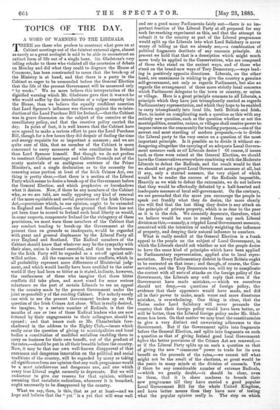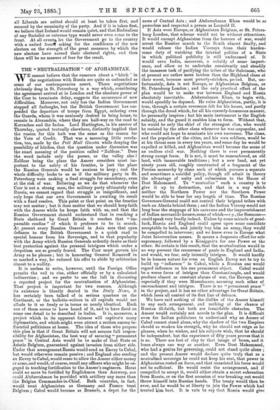TOPICS OF THE DAY.
A WORD OF WARNING TO THE LIBERALS. THERE are those who profess to construct what goes on at Cabinet meetings out of the faintest external signs, almost as surely as a great zoologist is said to be able to reconstruct an extinct form of life out of a single bone. Mr. Gladstone's very telling rebuke to those who violated all the courtesies of debate on Monday and did what they could to disgrace the House of Commons, has been constructed to mean that the break-up of the Ministry is at hand, and that there is a party in the Cabinet so eager to be unmuzzled before the General Election that the life of the present Government will be measured only " by weeks." We no more believe this interpretation of the dignified warning which Mr. Gladstone gave that it was not he who would suffer by the introduction of a vulgar anarchy into the House, than we believe the equally confident assertion that Lord Spencer's influence was thrown against the re-introduction of the Land Purchase Bill for Ireland,—that the Cabinet was in grave dissension on the subject of the coercive or the conciliatory policy, and that the coercive policy carried the day. In point of fact, it is well known that the Cabinet have now agreed to make a serious effort to pass the Land Purchase Bill, though for a few hours they did despair of finding the time and energy requisite for so important a measure ; and we are quite sure of this, that no member of the Cabinet is more concerned to carry measures of wise conciliation in Ireland than Lord Spencer himself. But though we do not profess to construct Cabinet meetings and Cabinet Councils out of the scanty materials of an ambiguous sentence of the Prime Minister's, and a single declaration as to the necessity for renewing some portion at least of the Irish Crimes Act, one thing is pretty clear,—that there is a section of the Liberal Party which seems to desire a break-up of the Government before the General Election, and which prophesies or foreshadows what it desires. Now, if there be any members of the Cabinet who, as we are told, are really opposing any kind of renewal of the more equitable and useful provisions of the Irish Crimes Act,—provisions which, in our opinion, ought to be extended to England and Scotland,—on the ground that there has not yet been time to accord to Ireland such local liberty as would, in some respects, compensate Ireland for the stringency of these provisions, we must warn these members of the Cabinet that any conduct tending to break-up the Government at the present time on grounds so inadequate, wculd be regarded with great and general displeasure by the Liberal Party all over England and Scotland. The Radical members of the Cabinet should know that whatever may be the sympathy with their aims, union is deemed essential, and that no tenderness for the Irish Party will be regarded as a set-off against selfwilled action. All the rumours as to bitter conflicts, which in all probability represent mere differences of Ministerial judgment, and which would hardly have been confided to the outer world if they had been so bitter as is stated, indicate, however, the restlessness of those who imagine that these bitter conflicts did take place, and must stand for some serious reluctance on the part of certain Liberals to see an appeal to the country made by the present Government under the joint mponsibili'y of the existing Cabinet. For nobody surely can wish to see the present Government broken up on the question of the Irish Crimes Act alone. What is really desired, we imagine, by a certain number of Radicals, is that the mouths of one or two of those Radical leaders who are now fettered by their engagements to their colleagues, should be opened ; and that issues such as Mr. Chamberlain foreshadowed in the address to the Eighty Club,—issues which really raise the question of giving to municipalities and local bodies a constitution of modified socialism enabling them to carry on business for their own benefit, out of the product of the rates,—should be put in all their breadth before the country. Now, it may be that our own well-known disapproval of that enormous and dangerous innovation on the political and social traditions of the country, will be regarded by many as taking all significance from our opinion that any such programme would be a most mischievous and dangerous one, and one which every true Liberal ought earnestly to deprecate. But we will endeavour to give our reasons for that opinion, without assuming that socialistic radicalism, whenever it is broached, ought necessarily to be disapproved by the country.
What we say, then, is this, that as yet at least—and we hope and believe that the " yet" is a yet that will wear well and see a good many Parliaments fairly out—there is no important fraction of the Liberal Party at all prepared for any such far-reaching experiment as this, and that the attempt to submit it to the country as part of the Liberal programme would split up the Liberals into what Lord Salisbury is never weary of telling us that we already are,—a combination of political fragments destitute of any common principle. At present we hold that that is a description which might much more truly be applied to the Conservatives, who are composed of those who stand on the ancient ways, and of those who stand on the brand-new ways of Tory Democracy,—ways leading in positively opposite directions. Liberals, on the other hand, are unanimous in wishing to give the country a genuineself-government, not only as regards Parliament, but also as regards the arrangement of those more strictly local concerns. which Parliament delegates to the town or country, or union. or village. Here is a great principle common to all Liberals, a principle which they have just triumphantly carried as regards Parliamentary representation, and which they hope to be enabled to carry triumphantly into local life, both British and Irish. Now, to insist on complicating such a question as this with any entirely new question, such as the question whether or not the municipalities, counties, unions, or villages shall receive power to. impose rates on the community for trading purposes,—one of the newest and most startling of modern proposals,—is to divide the Liberal party to the very centre on a question of the most important principle. Is it possible so to divide it without endangering altogether the carrying of an adequate Local Government measure such as all Liberals desire I Of course, if issues such as these were raised at the General Election, we should have the Conservatives everywhere combining with the Moderate Liberals to defeat the Radicals, and the result would be that we should not get a great Local Government measure at all, but if any, only a stunted measure, the very object of which. would be to render the success of the Radicals impossible.. Heartily as we wish to defeat the extremists, we do not believe that they would be effectually defeated by a half-hearted and inadequate measure of local self-government. On the contrary, we are persuaded that the more you encourage the people to speak out frankly what they do desire, the more clearly you will find that the last thing they desire is any attack on, the principle of private property, which is as dear to the poor as it is to the rich. We earnestly deprecate, therefore, what we believe would be sure to result from any such Liberal division as this,—namely, a crippled Local Government measure, conceived with the intention of unduly weighting the influence of property, and denying their natural influence to numbers.
What is really needed at the General Election is a frank appeal to the people on the subject of Local Government, in, which the Liberals should ask whether or not the people desire to have the same kind of principles which have been applied to Parliamentary representation, applied also to local representation. Every Parliamentary district in Great Britain ought to be contested on that issue ; and though, of course, the Conservatives, and the Tory Democrats too, will try to complicate the contest with all sorts of attacks on the foreign policy of the Government, the Liberals may well reply that even if the Government have made mistakes, — which we ourselves should not deny,—on questions of foreign policy, the evidence that their opponents would have made, and did all in their power to make, much worse and more disastrous mistakes, is overwhelming. One thing is clear, that the Tories under Lord Salisbury will never persuade the country that their foreign policy would have been better, or will be better, than the Liberal foreign policy under Mr. Gladstone has been. On that matter we may trust the constituencies to give a very distinct and unwavering adherence to the Government. But if the Government splits into fragments before the General Election, and splits into fragments on such a question as that of giving Ireland good local Government before the better provisions of the Crimes Act are renewed,— or if the Liberal Party splits up on such a question as that of giving the new " commune " power to trade for its own benefit on the proceeds of the rates,—we cannot tell what. might not be the result of the elections, so great would be the panic in many minds at the division of counsels. Yet if there be any considerable number of extreme Radicals, —which we greatly doubt,—it should be clear, even to them, that it is sheer madness to broach their new programme till they have carried a good popular Local Government Bill for the whole United Kingdom, and have better means than they have now of testing what the popular opinion really is. The step on which
all Liberals are united should at least be taken first, and secured by the unanimity of the party. And if it is taken first, we believe that Ireland would remain quiet, and that Radicalism of any Socialist or extreme type would never even come to the front. At all event let the Government go to the country with a united front? asking for the confidence of the new electors on the strength of the great measures by which the new electors have earned their electoral rights, and then there will be no manner of fear for the result.



































 Previous page
Previous page